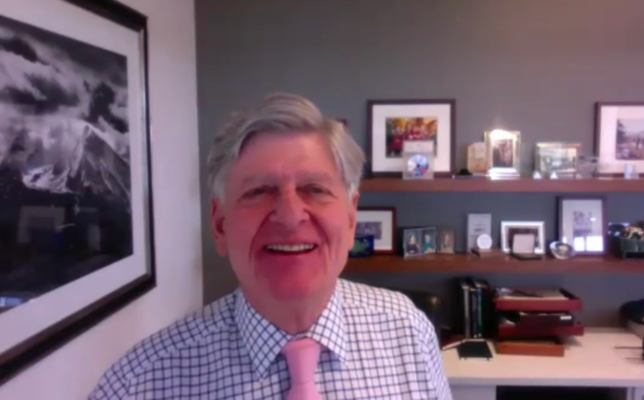Philanthropy
A Conversation with Terry Considine (Part 1 of 2)
The former Bradley Foundation chairman talks to Daniel P. Schmidt and Michael E. Hartmann about his decades’ worth of experience in real-estate investing, politics, and philanthropy.


Terry Considine is a successful Denver-based real-estate investor—including having founded AIMCO, the Apartment Investment and Management Company, among other things. He has also served in the Colorado state legislature and been involved in several statewide Republican political campaigns, including his own and others’. And he has been a longtime member of The Lynde and Harry Bradley Foundation’s board of directors, including as its chairman.
Considine’s interests are wide-ranging, his intellect is hearty, and his good nature is welcoming. From an Irish Catholic family of 11 children, he’s quite at home amidst—in fact, he seems to enjoy—some serious hurly-burly.
His tenure on Bradley’s board ended earlier this year. It was a pleasure for us to have been on the foundation’s program staff during those many years of his on its board, so we thought we’d try to talk to him again. He was nice enough to join us for a conversation last week.
The almost 13-and-a-half-minute video below is the first of two parts of our discussion; the second is here. In the first part, we talk about Considine’s decades’ worth of experience in real-estate investing, politics, and philanthropy.
Considine’s parents, he told us, “felt that philanthropy or charity was an integral part of life—that it wasn’t something special, it’s what you did, and that we’re all, in a sense, trustees for a time of whatever resources we have today.”
After some of his business success, “a good friend of mine here in Denver—a man named Larry Mizel, who saw something I had done” in philanthropy—“asked the question, ‘Did you work as hard on that as you did making the money to fund it?’ And the answer to that was no,” according to Considine. “Sometimes people do things because their intentions are good, but they have not necessarily thought through—how it’s going to be achieved and how success is going to be measured. Larry’s question still resonates with me.”
As for lessons to be learned from politics, and applied there and elsewhere, Considine outlined two risks. “The first, we know—which is that you run and might lose,” he said.
But the second one is also important—which is that you might run and win, and not make a difference and so waste your time. That’s a conversation I’ve had with many candidates over the years, including one quite recently. … If you’re in office, you only have a certain amount of capital, a certain amount of time. And it’s better to go big and try to make consequential change than to wait and not rock the boat.
At Bradley, “we have done a good job of staying focused on our purpose and not drifting,” Considine said. The foundation “is very focused on very clearly identified values that would be consistent with what the brothers would have wanted, and what our other donors would have wanted it, and we should feel good about not having lost our way.
“One of the opportunities of foundations or a philanthropy,” he noted, “is to take a longer view, but it’s important to have a point of view and it’s important not to accept a pace that is so slow as to underutilize the assets ….”
In the conversation’s second part, Considine talks about short- and long-term grantmaking strategies, the politicization of philanthropy and donor freedom, the imbalance between left and right among major givers, and what conservatives should try doing about it.
This article originally appeared in the Giving Review on June 27, 2022.



